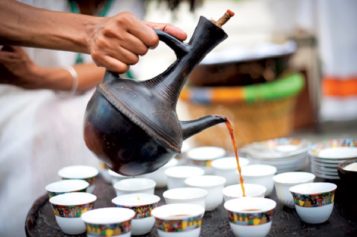Contrary to popular belief about coffee being harmful, a recent study revealed that coffee drinkers tend to live longer than those who don’t drink it. The study, conducted by the National Institutes of Health and AARP, was recently published in the New England Journal of Medicine. The results found that the type of coffee, regular or decaf, didn’t even matter.
The study was one of the largest ever conducted pertaining to the coffee debate, using over 400,000 people to gather information. “There may actually be a modest benefit of coffee drinking,” said lead researcher Neal Freedman of the National Cancer Institute. Coffee has always been a tricky beverage for researchers, since it includes a combination of helpful antioxidants and other harmful substances that have been linked to cancer. Most studies pertaining to coffee focus on the key ingredient, caffeine, but this didn’t play a major role in the latest study.
Researchers want the public to be aware that earlier studies are still accurate. There is enough data to prove that coffee can raise bad cholesterol and blood pressure, which can evolve into some rather severe heart problems. Surprisingly, when the study first began researchers were confident that their findings would have the same results. It appeared as if those who drank coffee could potentially die at any given moment, but they soon figured out it wasn’t because of the coffee. Those who were more likely to heavily drink coffee had rather unhealthy habits, such as smoking, drinking alcohol, and eating more red meat than those who didn’t drink coffee. After they sorted through the information and took these factors into account, it became evident that a good cup of joe each day could actually bump up the drinker’s chances of living longer.
Of course, there still isn’t enough proof to send people rushing to the grocery store just yet. Like most other studies, the results only show a correlation between the two rather than causality. Meaning that although the trend shows those who drink more coffee tend to live longer, there is not enough information to prove that they live longer because of the coffee.
The study began in 1995 using AARP members ranging in age from 50 to 71 who lived in different regions of the U.S, including California, Florida, New Jersey, Louisiana, parts of Georgia, and North Carolina. Researchers made sure to omit any AARP members who already had a heart disease or unhealthy diets. The amount of coffee each person drank was only measured once throughout the entire study, but Freedman claims that this shouldn’t be a problem. “People are fairly consistent in their coffee drinking over their lifetime,” Freedman explained. The survey included 402,260 people. While 42,000 reported that they didn’t drink coffee at all, another 15,000 reported they drink about six cups or more each day. The majority, however, drank two or three cups of coffee a day.
In 2008, about 52,000 of the participants had passed away. The results were quite unexpected. Men who had two or three cups of coffee a day were ten percent less likely to die at any age than those who reportedly drank no coffee. For women, the gap was even larger as the women who reportedly drank two or three cups of coffee were 13 percent less likely to die than those who drank no coffee. Although nobody is certain of what caused this trend, there is sufficient evidence to suggest coffee lowers levels of markers for inflammation and insulin resistance.

